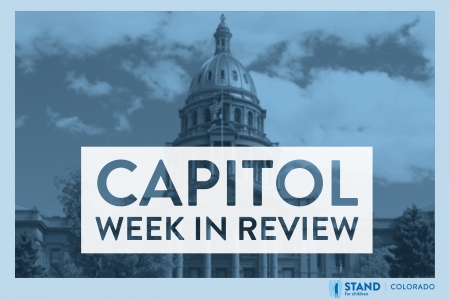Capitol Week in Review brings you news of bills we are tracking around our priorities of advancing educational equity and racial justice in Colorado and making our schools and communities safer and more supportive.
Legislative Update
HB23-1003, School Mental Health Assessment, creates the sixth through twelfth grade mental health assessment program. The hearing for this bill was rescheduled for April 13th.
HB23-1024, Relative And Kin Placement Of A Child, which establishes measures to support reunification of a child or youth with their family when the child or youth has been temporarily placed with a relative or kin, will be heard April 12 by the Senate Health and Human Services Committee.
HB23-1109, School Policies and Student Conduct, was postponed indefinitely, meaning it will not advance further this year, by a unanimous vote in the House Education Committee. This bill aimed to strengthen due process rights for students, particularly as it pertained to behavior off school grounds and outside of school hours. It also increased the training for expulsion hearing officers, including training around disabilities and trauma-informed care and interventions.
HB23-1168, Legal Representation And Students With Disabilities, which requires CDE to create and maintain a list of attorneys qualified to represent a parent in a due process complaint and creates a fund to pay attorneys defending parents against due process complaints filed by an education provider, is scheduled to be considered by the Senate April 10.
HB23-1169, Limit Arrest For Low-level Offenses, which prohibits a peace officer from arresting a person based solely on the alleged commission of a petty offense, except for high level misdemeanors directly impacting victims (e.g. theft), was postponed indefinitely by the House Judiciary Committee.
HB23-1231, Math in Pre-Kindergarten Through Twelfth Grade, will be heard by the House Appropriations Committee April 10. This bill will support math educators with evidence-based training and interventions to help K- 12th grade students struggling in math. The bill also includes $1.6 million for the Ninth Grade Success Grant program to help ensure that more Colorado students finish their 9th grade year on-track and graduate high school prepared for post-secondary success.
HB23-1235, Technical Modification To Department Of Early Childhood, makes technical changes HB22-1295, which created Colorado’s universal preschool program. This bill would allow the Department of Early Childhood to enter into contracts for early literacy programming and whole-child services, and ensures policy is aligned to current state and federal standards and was passed 7-4 by the House Education Committee.
HB23-1249, Reduce Justice Involvement for Young Children, which changes the minimum age – from 10 to 13 – of children who are subject to prosecution in juvenile court; except in the case of homicide, was passed by the House Judiciary Committee 9-4 and referred to the House Appropriations Committee.
HB23-1263, Translating Individualized Education Programs, permits the multidisciplinary team that creates an individualized education program (IEP) for a child, who may be eligible for special education services, to translate the IEP draft documents into the dominant language spoken in the home of the child’s parent, guardian, or legal custodian. The bill is scheduled to be heard by the House Education Committee April 13th.
SB23-004, Employment Of School Mental Health Professionals, which authorizes a school district to employ health professionals, who are not licensed by the Colorado Department of Education but hold a Colorado license for their profession was passed unanimously by the House Education Committee.
SB23-039, Reduce Child And Incarcerated Parent Separation, which requires the Department of Human Services to prioritize and facilitate communication and family time between children and their parents who are incarcerated, passed unanimously by the House Public & Behavior Health and Human Services Committee and was referred to the Appropriations Committee.
SB23-70, Mandatory School Resource Officer Training, is a bill that would require a law enforcement officer to complete a Safe2Tell training curriculum before working as a school resource officer; it was passed unanimously by the House Education Committee.
SB23-087, Teacher Degree Apprenticeship Program, which creates a teacher degree apprenticeship program as an alternative route to teacher licensure and helps to alleviate the educator shortage, was passed unanimously by the House Education Committee.
SB23-099, Special Education Funding, which increases special education funding by an additional $40,203, 671, is scheduled to be heard by the House Education Committee April 10.
SB23-258, Consolidate Colorado Educator Programs In Colorado Department of Education, which consolidates the review and approval process for educator preparation programs under the Department of Education and the State Board of Education is scheduled to be heard April 10 by the Senate Education Committee.
Our Take
After hours of compelling testimony, nine members of the House Judiciary Committee voted to pass HB23-1249, Reduce Justice-involvement For Young Children. This legislation will end the prosecution of children 12 years and younger and empower alternative child-serving systems, including mental health, education, and child welfare agencies, to address the behavior, deliver treatment and family supports instead of prosecution. We applaud the members that voted to advance this important legislation.
Take Action
Send a thank you note to the legislators that voted to pass HB23-1249 with one click!
What We’re Reading
Opinion: Families shouldn’t go into debt paying for prison calls
School district invites mental health co-responders to assist school resource officers





